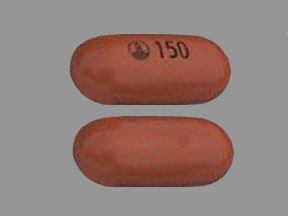Nintedanib Dosage
Medically reviewed by Drugs.com. Last updated on Jun 10, 2024.
Applies to the following strengths: 100 mg; 150 mg
Usual Adult Dose for:
Additional dosage information:
Usual Adult Dose for Idiopathic Pulmonary Fibrosis
150 mg orally twice a day (every 12 hours)
Maximum daily dose: 300 mg
Comments:
- Conduct liver function tests prior to initiating therapy.
- Perform a pregnancy test in females of reproductive potential before starting treatment.
Uses:
- For the treatment of idiopathic pulmonary fibrosis (IPF)
- For the treatment of chronic fibrosing interstitial lung diseases (ILDs) with a progressive phenotype
- To slow the rate of decline in pulmonary function in patients with systemic sclerosis-associated interstitial lung disease (SSc-ILD)
Usual Adult Dose for Interstitial Lung Disease
150 mg orally twice a day (every 12 hours)
Maximum daily dose: 300 mg
Comments:
- Conduct liver function tests prior to initiating therapy.
- Perform a pregnancy test in females of reproductive potential before starting treatment.
Uses:
- For the treatment of idiopathic pulmonary fibrosis (IPF)
- For the treatment of chronic fibrosing interstitial lung diseases (ILDs) with a progressive phenotype
- To slow the rate of decline in pulmonary function in patients with systemic sclerosis-associated interstitial lung disease (SSc-ILD)
Renal Dose Adjustments
Mild to Moderate Renal Dysfunction (CrCl 30 to 90 mL/min): No adjustment recommended.
Severe Renal Dysfunction (CrCl less than 30 mL/min): Data not available
Liver Dose Adjustments
LIVER DYSFUNCTION:
Mild Liver Dysfunction (Child-Pugh A): 100 mg orally twice a day (every 12 hours)
Moderate or Severe Liver Dysfunction (Child-Pugh B or C): Use is not recommended.
LIVER ENZYME ELEVATIONS:
- AST or ALT between 3 to 5 times the upper limit of normal (3 to 5 x ULN) without signs of liver damage: Interrupt therapy or reduce the dose to 100 mg orally twice a day (every 12 hours); once values return to baseline, resume at reduced dose and if tolerated, increase to full dose of 150 mg orally twice a day (every 12 hours).
- AST or ALT greater than 3 x ULN and WITH signs of liver damage: Discontinue therapy
- AST or ALT greater than 5 x ULN: Discontinue therapy
Dose Adjustments
Dose Adjustment for the Management of Adverse Reactions:
- Consider dose reduction or temporary treatment interruption until reaction has resolved to levels that allow therapy continuation.
- May resume therapy at full dosage of 150 mg orally twice a day (every 12 hours), or reduced dosage of 100 mg orally twice a day (every 12 hours); increase to full dose if tolerated.
- Discontinue therapy in patients who cannot tolerate 100 mg orally twice a day (every 12 hours).
- Patients with mild liver dysfunction (Child-Pugh A): Consider treatment interruption or discontinuation for the management of adverse reactions.
Precautions
CONTRAINDICATIONS: None
Safety and efficacy have not been established in patients younger than 18 years.
Consult WARNINGS section for additional precautions.
Dialysis
Data not available
Other Comments
Administration advice:
- For oral use
- Administer this drug with food.
- Capsules should be swallowed whole with liquid; do not chew due to bitter taste.
- Do not open or crush capsules; wash hands immediately and thoroughly if contact with contents occurs.
- If a dose is missed, the next dose should be taken at the next scheduled time; patients should not make up for a missed dose.
Storage requirements:
- Store at 20C to 25C (68F to 77F); excursions permitted to 15C to 30C (59F to 86F).
- Protect from exposure to high humidity and avoid excessive heat; if repackaged, use USP tight container.
General:
- It is recommended that patients stop smoking during treatment. Cigarette smoking was associated with decreased drug exposure.
Monitoring:
- Hematologic: For bleeding in patients on chronic, full dose anticoagulation (during treatment)
- Hepatic: Liver function tests, including AST/ALT and bilirubin (prior to treatment, monthly during first 3 months, and then every 3 months as clinically indicated; assess promptly in patients reporting signs of liver injury)
Patient advice:
- Read the US FDA-approved patient labeling (Patient Information).
- Take this medication with food and swallow capsules whole.
- Understand that monitoring of liver function tests is recommended prior to treatment and periodically; report any symptoms of a liver problem.
- Contact your health care provider at the first signs of diarrhea, nausea, and vomiting.
- Report any signs and symptoms of unusual bleeding, gastrointestinal perforation, or proteinuria.
- Seek immediate medical attention if signs/symptoms of acute myocardial ischemia occur.
- Stop smoking prior to and during treatment, if possible.
- Female patients of childbearing potential: Avoid becoming pregnant during treatment. Notify your health care provider of a known/suspected pregnancy. Breastfeeding is not recommended during therapy.
Frequently asked questions
More about nintedanib
- Check interactions
- Compare alternatives
- Reviews (36)
- Side effects
- During pregnancy
- Drug class: multikinase inhibitors
- Breastfeeding
- En español
Patient resources
Other brands
Professional resources
Other brands
Related treatment guides
Further information
Always consult your healthcare provider to ensure the information displayed on this page applies to your personal circumstances.


